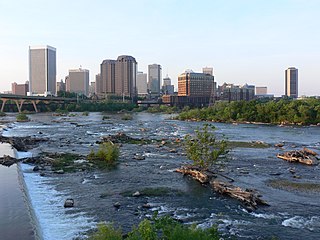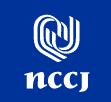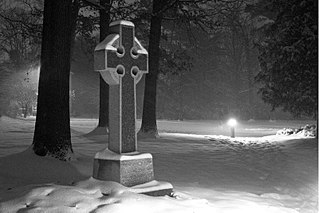
Lynchburg is an independent city in the Commonwealth of Virginia in the United States. First settled in 1757 by ferry owner John Lynch, the city's population was 79,009 at the 2020 census, making Lynchburg the 11th most populous city in Virginia. Located in the foothills of the Blue Ridge Mountains along the banks of the James River, Lynchburg is known as the "City of Seven Hills" or the "Hill City". In the 1860s, Lynchburg was the only city in Virginia that was not recaptured by the Union before the end of the American Civil War.

Interfaith dialogue refers to cooperative, constructive, and positive interaction between people of different religious traditions and/or spiritual or humanistic beliefs, at both the individual and institutional levels. It is distinct from syncretism or alternative religion, in that dialogue often involves promoting understanding between different religions or beliefs to increase acceptance of others, rather than to synthesize new beliefs.

Virginia Wesleyan University (VWU) is a private university in Virginia Beach, Virginia. The university is nonsectarian but historically affiliated with The United Methodist Church. It enrolls 1,607 students annually in undergraduate and graduate programs, 355 students at LUJ/VWU Global (Japan), and 1,403 in VWU Online. Virginia Wesleyan transitioned from a college to a university in 2017.

The Greater Richmond Region, the Richmond metropolitan area or Central Virginia, is a region and metropolitan area in the U.S. state of Virginia, centered on Richmond. The U.S. Office of Management and Budget (OMB) defines the area as the Richmond, VA Metropolitan Statistical Area, a Metropolitan Statistical Area (MSA) used by the U.S. Census Bureau and other entities. The OMB defines the area as comprising 17 county-level jurisdictions, including the independent cities of Richmond, Petersburg, Hopewell, and Colonial Heights. As of 2020, it had a population of 1,314,434, making it the 44th largest MSA in the country.

The National Conference for Community and Justice is an American social justice organization focused on fighting biases and promoting understanding between people of different races and cultures. The organization was founded in 1927 as the National Conference of Christians and Jews in response to anti-Semitism and anti-Catholic sentiment surrounding Al Smith's run for President.

Eastern Virginia Medical School (EVMS) is a public medical school in Norfolk, Virginia. Founded by grassroots efforts in the Southeastern part of Virginia known as Hampton Roads, EVMS is not affiliated with an undergraduate institution and coordinates training through multiple medical centers in the Hampton Roads region. EVMS campus includes the 555-bed Sentara Norfolk General Hospital, the region's only tertiary level 1 trauma medical care facility, and the 212-bed Children's Hospital of The King's Daughters, a regional pediatric referral care facility and only stand-alone children's hospital in the state. EVMS is the first institution in the US to have produced a viable fetus through in vitro fertilization. EVMS is most known for its reproductive medicine and simulation/standardized-patient education as well as research in pediatrics, geriatrics, diabetes, and cancer. In addition, EVMS is well known for its leadership in community service and medical missions as evidenced by faculty and alumni responsible for the founding of Operation Smile, Physicians for Peace, Global Brigades, and CONRAD.
The Washington Theological Consortium is an ecumenical organization of Christian theological schools and interfaith partners located in Washington, DC, Virginia, Maryland, and Pennsylvania. Members cooperate to deepen ecumenical unity in theological education and to broaden interfaith dialogue and understanding and to prepare both clergy and laity with skills they need to minister in a diverse church and society. The Consortium is one of the most diverse of its kind in the nation, as it includes Roman and Byzantine Catholic traditions, mainline Protestants, Evangelicals, and Historic Black Divinity schools; with partners in spiritual formation, Jewish, and Islamic education.
Formerly founded as the Sikh Mediawatch and Resource Task Force (SMART) in 1996, the Sikh American Legal Defense and Education Fund (SALDEF) is a national civil rights and educational organization in the United States. SALDEF is a national 501(c) 3 non-profit, nonpartisan, membership-based body.

The Islamic Society of Boston (ISB) is an organization that runs two mosques in the Boston area. The original mosque called Islamic Society of Boston is in Cambridge, Massachusetts. In 2007, the Islamic Society of Boston Cultural Center (ISBCC) was built in Roxbury, Boston. Both mosques offer daily, weekly and annual programs for Muslims including Arabic and English classes on religious and secular topics. ISB also has a religious school for children and holiday programs. It organizes trips and summer camps for children and classes on Islam for new and non-Muslims.

Kimberly Ann Bobo is an American religious and workers' rights activist, and current executive director of the Virginia Interfaith Center for Public Policy (VICPP), a non-partisan advocacy coalition based in Richmond, Virginia. Bobo is a nationally known promoter of social justice who leads VICPP's advocacy, outreach, and development work. She wrote a book on faith-based organizing entitled Lives Matter: A Handbook for Christian Organizing.

The Interfaith Encounter Association (IEA) is an Israeli-based non-profit organization. Its primary purpose is to foster dialogue between different religious groups within the Holy Land. This is done on a grassroots level throughout Israel and the Palestinian Territories.
The Miami Coalition of Christians and Jews is a nonsectarian nonprofit organization dedicated to advancing understanding and respect among people of all cultures, religions and races. The organization strives for a community free from intolerance in which every person enjoys dignity and respect.
The Direct Action and Research Training Center (DART) is a national network of 23 local faith-based community organizing groups across nine states. DART provides training and consultation for local leaders and professional organizers, giving local communities the skills they need to uncover and take action on pressing local problems. As of 2007, DART is the fourth largest congregation-based community organizing network in the United States.
Bet Mishpachah is a Jewish egalitarian worshiping community in the Dupont Circle area of Washington, D.C. It is one of a number of national and international Jewish communities of "LGBT affirming congregations" that specifically welcome and "embrace" the LGBT community, along with all others who "wish to participate in an inclusive, egalitarian, and mutually supportive community." Membership is open to all singles, couples, and families, regardless of religious affiliation, sexual orientation, or gender identity.
Jewish Veg is an international 501(c)(3) charitable organization whose mission is to encourage and help Jews to embrace plant-based diets as an expression of the Jewish values of compassion for animals, concern for health, and care for the environment. Jewish Veg was formerly called Jewish Vegetarians of North America (JVNA) and, prior to that, the Jewish Vegetarian Society of America.

Rappahannock Community College (RCC) is a public community college with two campuses in Virginia, one in Glenns and the other in Warsaw. There are three off-campus sites — one in Kilmarnock, one in King George, one in New Kent County. The institution is one of the twenty-three colleges in the Virginia Community College System. It mostly serves students living on the Middle Peninsula and the Northern Neck, but it also has students from other parts of Virginia. RCC offers associate degrees, certificates, career studies certificates, dual enrollment credit, non-credit programs, lifelong learning credits, and programs for incarcerated students.

The Future Business Leaders of America, or FBLA, is an American career and technical student organization headquartered in Reston, Virginia. Established in 1940, FBLA is a non-profit organization of high school ("FBLA"), Middle Level, and college students, as well as professional members, who primarily help students transition to the business world. FBLA is one of the largest student organizations in the United States, with 253,365 members, and the largest career student organization in the world. Local FBLA chapters are often connected to their school's business education department, and most advisers are business education teachers.
The InterFaith Leadership Council of Metropolitan Detroit is a faith-based civic organization founded in 2010 by members of a Detroit-based interfaith group known then as the Interfaith Partners. Its headquarters are in Oak Park, Michigan.
The National Federation for Just Communities is a coalition of social justice member organizations across the United States which work to overcome racism, bias, and discrimination. The coalition of was formed in 2006 after the dissolution of the National Conference for Community and Justice. Members meet annually at a conference hosted by one of NFJC's affiliate offices.

Bon Air Presbyterian Church (PCUSA), which began in 1884, is an historic Presbyterian church and preschool located on Huguenot Road in Bon Air, Virginia, a census-designated place (CDP) in Chesterfield County, Virginia, in the United States. The church and its location are thought to be named after the French term for "good air". The name choice may have been influenced by the 18th century settlement in the region of religious refugee French Huguenots and by the later popularity of the settlement as a summer resort and park accessible by streetcar from Richmond. Bon Air Presbyterian Church first began worshiping in a little Victorian Gothic building known as the “Union Chapel", located on Buford Road, south of the James River in the Southside of Richmond. "Union Chapel" served the Bon Air Presbyterian congregation until 1963. The number of members grew, and a new church building was erected at 9201 West Huguenot Road in North Chesterfield, Virginia to meet the needs of the larger congregation.










